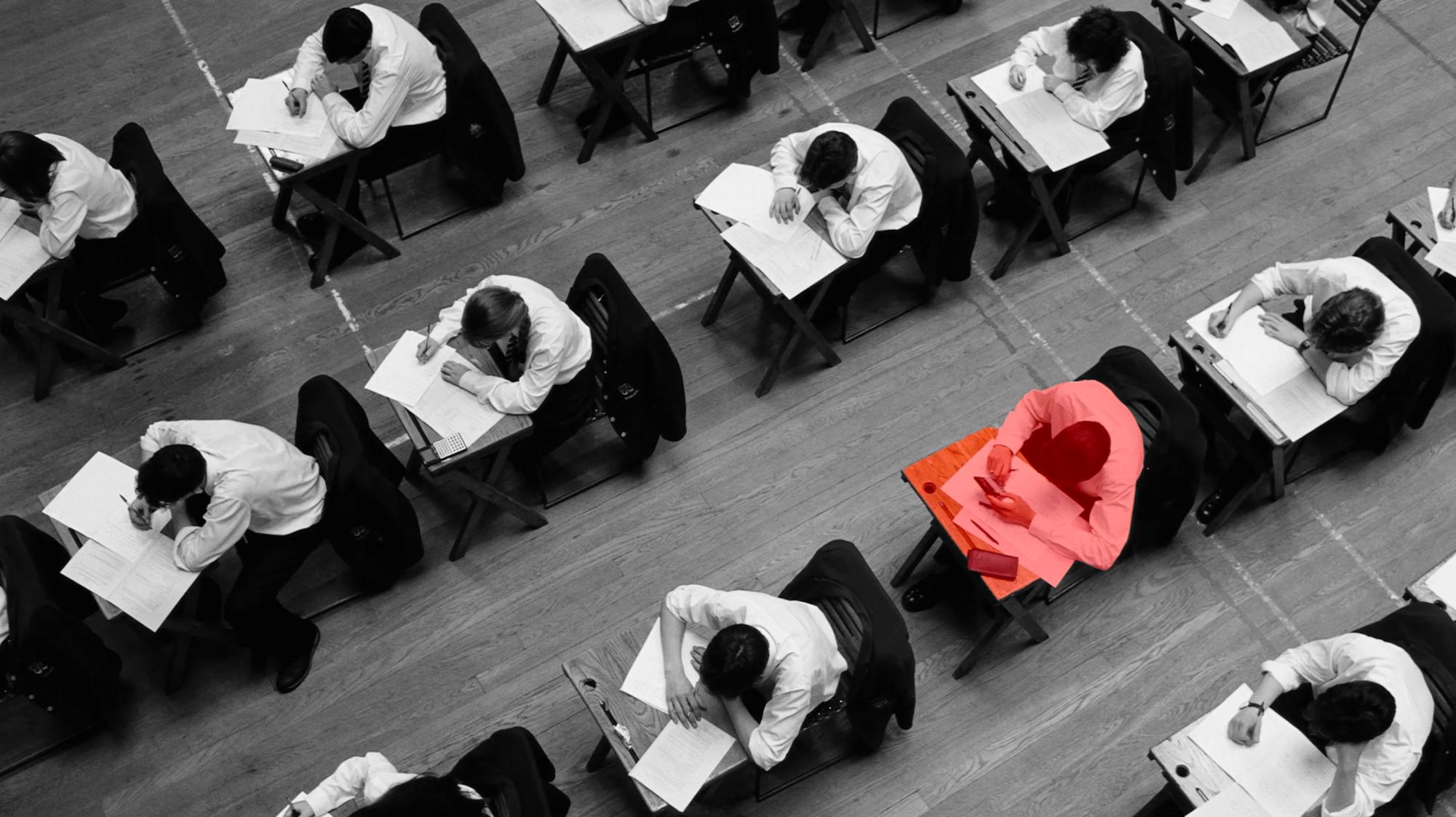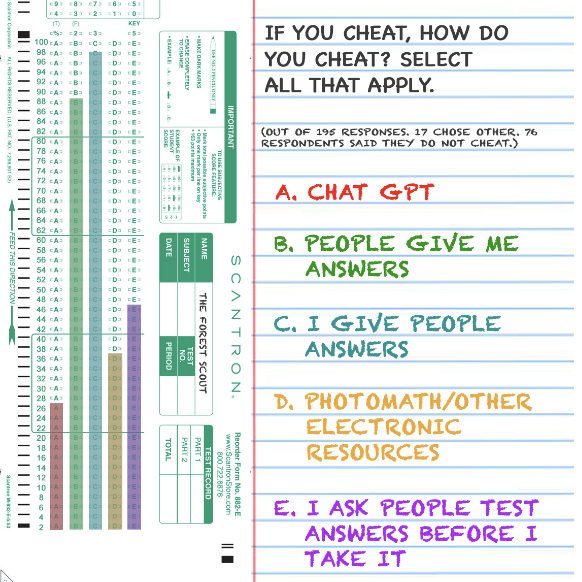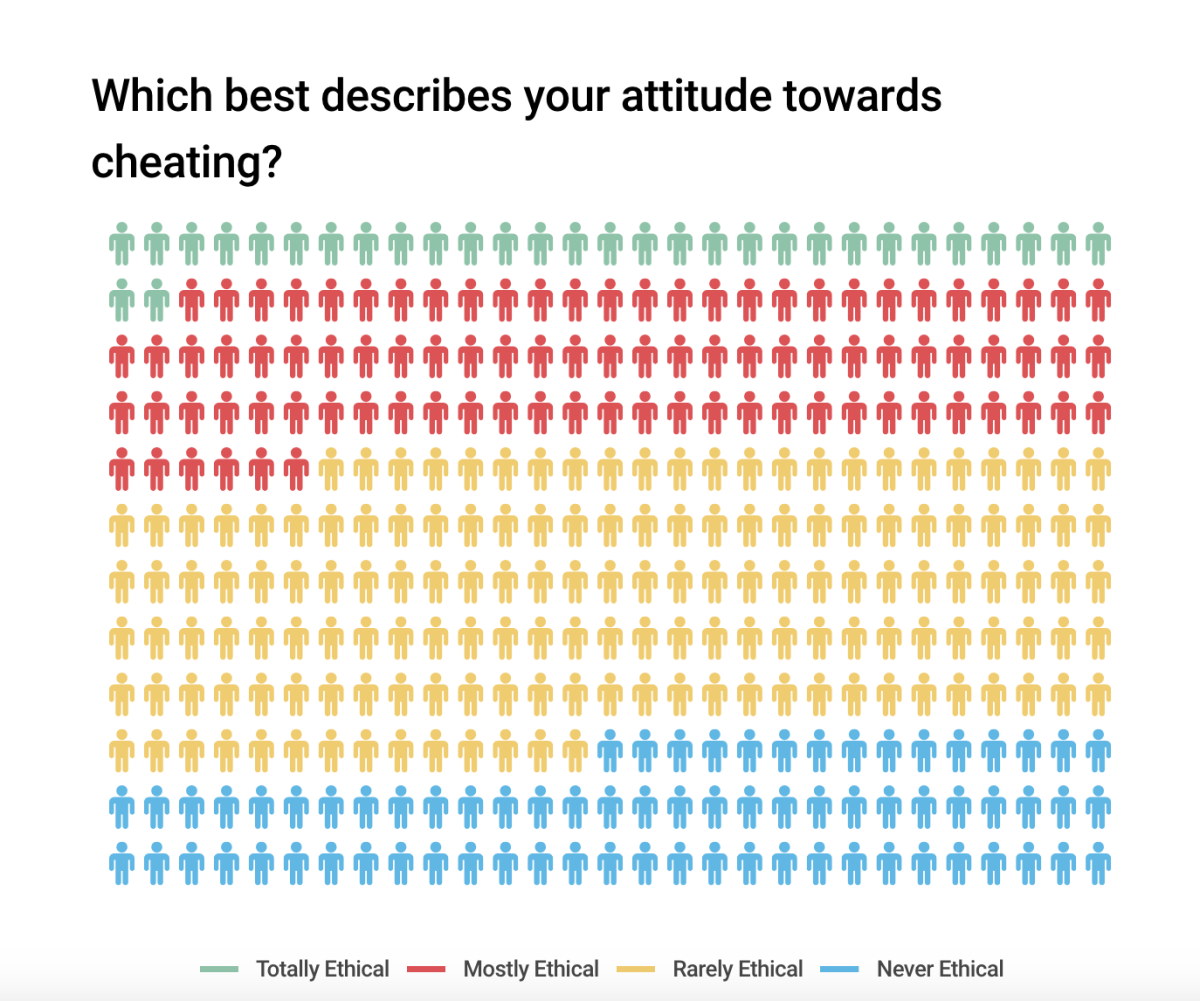A Culture of Cheating

John has an English test in 20 minutes. He starts to panic, and his mind races as he realizes he is completely unprepared and certain to fail the 50-word vocabulary test.
How did John find himself in this predicament? He didn’t have time to study last night after extracurricular activities, sports, college applications, and homework. He had been doing school activities from 8 a.m. until 10 p.m., with the exception of a short break to shower and eat dinner.
John evaluates his options. Should he try to cram 50 words and their definitions into his head in 20 minutes, accept that his grade will drop, or resort to a third option – cheating?
He feels the pressure of fulfilling parental expectations, maintaining the academic record he has worked so hard to achieve, and attaining acceptance into a top-tier college.
This scenario is not unusual. Many students find themselves facing this very situation on a regular basis.
What would the typical student do in this scenario?
To find out, The Forest Scout anonymously polled students and staff to determine the extent of cheating at LFHS. Nearly 250 students and teachers responded. While not a scientifically accurate poll, the survey results show that most students have cheated in the last month, and many see no ethical problem with cheating. The survey also revealed that teachers are worried about the rising levels of cheating.
One of the students The Forest Scout surveyed was “John,” (not his real name) who was unprepared for his English test. John revealed that after considering the negative repercussions that would result from failing his test, he decided that the only real option he had was to cheat.
John admitted to cheating through the use of an electronic device that played an audio loop of the vocabulary words and their definitions that he listened to during the test.
“My teachers don’t even realize how powerful [these electronic devices] are, they have Bluetooth, microphones, and so much more,” said John, who agreed with The Forest Scout to keep his identity anonymous.
John said he “doesn’t advise doing this as it wasn’t worth the time and effort.” And further admits that he resorted to this method only once and has “stopped since [that test].”
However, for many students, according to the survey, cheating has become a habitual practice.
In the anonymous survey that The Forest Scout sent to the student body via email, 59% of 195 students responded that they had cheated this school year. The frequency of cheating varied, and cheating was not defined in the survey question.
Cheating increased dramatically during the pandemic, in part due to the absence of teacher supervision in a structured classroom environment. Although at LFHS, “E-Learning” ended in 2022, high levels of academic dishonesty continue.
The common perception among students interviewed by The Forest Scout is that at least 95% of the student body has at one time or another cheated.
“Honestly, everyone has probably asked someone for homework at some point,” said senior Bolurin Taiwo.

Students employ a broad range of methods in an effort to “game the system.” These range from the most basic, such as copying homework and students giving or receiving answers to fellow students, to the more technologically advanced methods, which sound as if they were developed for James Bond himself.
Three such advanced methods include: “The Airpod Hack” – where students play a repeating voice note of math formulas or other information during a test through Airpods. “The Personal Hearing Aid Method”- programming audio cues and answers into personal hearing aid devices. Lastly, there is “The Image Hack” where the individual uploads images of formulas, solved example problems, and actual test answers onto calculators which are then used during math tests.
These calculators are quite common and are even approved by standardized testing organizations such as the ACT and SAT.
According to The Forest Scout’s survey, 50% of students who cheat reported giving others the answers to homework or test questions as their primary method of cheating.
Many students who admitted to sharing answers had in common the justification that they felt obligated to do so. “If you don’t give your friends the answers you’re being a bad friend,” one student wrote.
Among survey respondents who admitted to cheating, 33% say they use ChatGPT, AI, or other online resources as their primary method of cheating.
The administration has been forced to adapt to the recent emergence of AI programs, which can produce full essays in a matter of seconds. Just this year, the social studies department removed the U.S. history research paper from the curriculum – a paper that was once a graduation requirement.
“The goal of U.S. history classes is to learn U.S. history, and if ChatGPT can write students papers for them in an hour when teachers don’t have enough safeguards or time to thoroughly check for plagiarism, it’s not worth it to keep the paper as a requirement,” said social science teacher Mrs. Cheryl Kyrias.
Despite plagiarism detection methods, such as Turnitin.com, that English and social studies teachers have utilized, many students using AI are not discovered.
“There’s no way for us to get real definitive proof of cheating every time,” said EdTech Mr. Jimmy Juliano, who is often asked to analyze work that teachers suspect of being AI-generated or plagiarized.
The advent of AI has made plagiarism just a few keystrokes away, and students are taking advantage of it.
“Before AI, [the EdTechs] weren’t really involved in any cheating monitoring, but now a lot of teachers are coming to us with AI questions,” said Juliano. “It is so much easier to cheat now [than before the pandemic], I worry that there is a lot more going on than anyone is aware of. There’s so many avenues to cheat, so many really good avenues.”
Many students do not believe that cheating is morally wrong. In fact, 79% of student respondents to The Forest Scout’s survey believe that cheating is ethical to some degree, whether that be “totally ethical,” “mostly ethical,” or “rarely ethical.”
Cheating occurs regardless of an institution’s reputation. It occurs in underperforming schools and elite schools alike. However, there may be a correlation between students cheating and their school’s level of competitiveness.
At a school where the expectations are higher, a student may feel compelled to resort to cheating to ensure they don’t fall behind academically or to gain an advantage over their peers.
Students report that the most common justification for cheating is the competitive nature of the school, which creates pressure for them to meet the high-grade expectations of their parents, teachers, and the institution itself, as most students are vying for acceptance at a prestigious, top-tier university.
The LFHS student handbook defines academic dishonesty as “cheating, copying, plagiarizing, or representing the work of others as your own through verbal, written, graphic, electronic or other means.”
Approximately 50% of students who reported cheating said that they did so because of the competitive nature of school.
“Nobody cheats to be evil. We cheat because we know the expectations of our parents and teachers. We can’t let them down. We cheat because we need good grades, and sometimes the workload is overwhelming and we need to get something done, no matter what,” said one survey respondent.
Other respondents voiced their frustration with the American education system, which many feel stresses the importance of grades over learning.
One respondent said, “I think it is ethical to cheat on tests because it is a spit in the face to the corrupt and greedy education system.”
The second most common reason students reported cheating was laziness. Approximately 34% of respondents said that they think students are most motivated to cheat because they are lazy and cheating saves them time.
“Being unprepared for a test and general laziness are what cause people to cheat the most,” said senior Thomas Hasselbring. “No one wants to do badly and fall behind if they don’t study.”
The third most common reason students feel motivated to cheat was stated to be teachers’ failure to adequately teach the subject matter – 15% of respondents hold this belief.
Lastly, 9% of student respondents justified cheating by claiming that cheating is completely ethical because they view it as a victimless offense and further believe that everyone does it.
Despite the above findings, students’ views on cheating are variable depending on the nature of the circumstances.
“I think all cheating is wrong, but cheating on an exam or test is far worse than cheating on a homework assignment,” said junior Powell Brickman.
Most students interviewed by The Forest Scout said that cheating on standardized tests such as an AP exam or the ACT is unacceptable, as they noted that it would clearly negatively impact others and would result in major, negative consequences if their wrongdoing was discovered.
“Cheating on standardized tests is crossing a line,” said senior Teddy Huddleston.
And then there are 1/5th of respondents who believe that cheating is never acceptable regardless of the circumstances.
“I don’t agree with cheating because it robs you of the purpose of school,” said senior Oliver Silver.
When AP Calculus teacher Mr. Blaine Lakin opened his computer one July morning to check the AP score results for his classes, he was shocked. A student who he thought was one of his top students got one of the lowest scores on the exam. This indicated to Lakin that the student had been cutting corners in class all year.
Since AP scores are not released until long after the school year ends, Lakin had “no idea such was the case until [the student] left.”
This situation forced Lakin to change how he teaches calculus. Now, he has students solve problems on whiteboards together as a class and even requires his AP students to take a verbal exam in April.
“A 15-minute comprehensive conversation tells me all I need to know about their knowledge of calculus,” said Lakin.
Lakin is not the only teacher to take notice of cheating. Out of 51 LFHS staff members surveyed, 56% believe cheating is a “moderate” problem at LFHS and 32% believe it is a “serious” problem.
English teacher Mrs. Carolyn Konz is leaning towards reverting to pen and paper for major writing assignments in her classes to steer students away from cheating while encouraging original thought.
“If we remove the temptation of ChatGPT, Sparknotes, etc., students can sharpen their critical thinking, organizing, and vocabulary skills,” said Konz. “Ultimately, this is all we want for them: original thought and voice.”
Despite efforts to prevent or limit cheating, it still persists. Though neither condones cheating, both Lakin and Konz understand why some students resort to it.
“I do not value cheating. That being said, there are so many students that have the cards stacked against them,” said Lakin. “I often hear of students having to stay up late to get their work done, and from an emotional and wellness standpoint – this is not feasible. Other students may have a history of cheating, and as such, their foundation in these affected subjects is flimsy.”
Similar to Lakin, Konz believes said students cheat when they become overwhelmed or are not prepared for an assignment. Konz also adds that students tend to cheat when they are placed in classes above the level they should truly be in.
“The material is over their heads so they resort to plagiarism,” said Konz. “This is especially true in an honors English class. Literary Analysis is difficult. If a student doesn’t have the time to really think through a book or even read the book, plagiarism becomes an attractive option.”
The student handbook states that a student who engages in academic dishonesty will receive one or more of the following consequences: “Zero for the assignment and/or assessment, partial credit for a resubmitted, original assignment and/or assessment, and detention or alternative to in-school suspension.”
Additionally, when academic dishonesty occurs the teacher is responsible for contacting the student, contacting the student’s parent/guardian, and finally contacting the student’s dean who is responsible for reporting the dishonesty.
All cases of academic dishonesty are “documented and filed at LFHS,” which according to Dean Mr. Jonathan Silver, means the record is contained on a student’s PowerSchool account.
Some teachers don’t feel this policy goes far enough and feel that the lack of more meaningful consequences may be a further incentive for students to cheat. One staff respondent to the survey said, “The ‘punishments’[for cheating] at LFHS are rewards.”
76% of staff members said there should be a stricter cheating policy set in place.
“To combat cheating, I believe that the school needs to take a stronger stance in terms of penalties. I believe that everyone should earn a second chance, yet at some point, there needs to be serious consequences. If students continually plagiarize in an honors class, they are showing us that they are placed incorrectly,” said Konz.
Lakin expressed interest in a committee that would brainstorm preventative and creative methods to combat cheating in LFHS.
Given the current upward trajectory of cheating levels, unless serious consequences are implemented or there is a collective shift in students’ attitudes toward cheating, this issue will persist, posing serious future ramifications.
As one staff respondent said, “This situation has dire consequences for the future.”
Your donation will support the student journalists of Lake Forest High School. Your contribution will allow us to purchase equipment and cover our annual website hosting costs.


















Abby • Dec 8, 2023 at 10:24 am
Such a good article that I think it should be checked for AI.
Jason • Dec 8, 2023 at 1:40 pm
I ran the first section through GPTZero.
17% likelihood the text was written by an AI. No lines stand out as AI-written.
More specific details are behind a paywall.
Alex Mann • Dec 8, 2023 at 9:14 am
This is a great article, but I wonder about how common the hypothetical that is the premise for the story actually is. If a student has NO time to study between 8am and 10pm, then I think it is fair to say that student should consider limiting their extracurriculars, or adding a study hall. Sometimes I think students feel as though they have no time, when really the problem is time management rather than the absence of time. Regardless, this is a fascinating and well-written piece.
Jason • Jan 29, 2024 at 11:19 am
Students are already expected to spend every waking moment doing schoolwork and extracurriculars in order to be competitive for college recruitment, and colleges don’t pay attention to the fact that high school homework takes time as well as in-class or on-field work. For many, neglecting academics is the only option to maintain basic physical and mental health.
What part of “Eight hours of work, eight hours of rest, eight hours of what we will!” does the education system not understand?